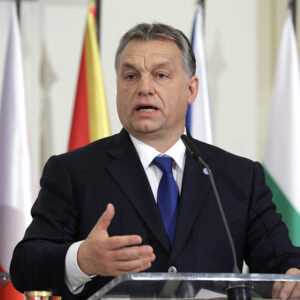The 27-member European Union has agreed to a partial ban on Russian oil in a move that will affect 75 percent of its imports now and 90 percent by the end of the year. The bloc had originally proposed to impose an immediate and full embargo on all Russian imported oil but had to settle for a little less.
This compromise was forced by Hungary’s prime minister, Viktor Orban, whose country is 65 percent dependent on Russian oil flowing through a single pipeline, the “Druzhba” (Friendship), with antiquated technology. At first he refused to discuss Russian oil at all.
To cut these supplies overnight, Orban said, would be like dropping a nuclear bomb on the Hungarian economy.
It was one of the rare occasions the EU leaders agreed with Orban — though reluctantly in some cases. They also conceded there should be no deadline for his country to fall in line with the rest of Europe.
“He (Orban) had a point,” the Netherlands’ premier commented after the meeting. As in other policy areas, the Hungarian exception prevailed.
Orban has a reputation for giving the finger to foreign consensus; indeed, he seems to relish doing so.
“Hello, dictator” was the greeting to Orban by the European Commission’s executive leader seven years ago on Orban’s arrival in Brussels for a summit. Far from taking offense at this diplomatic discourtesy, the beefy Budapest visitor was flattered: It was a backhanded acknowledgment of his increasingly drastic attacks on civil rights, press freedom and the judiciary in Hungary’s “illiberal democracy,” as the rule of law is cast adrift down the Danube.
Things are getting worse — much worse — since the recent thumping Fidesz Party electoral victory. Its two-thirds of the votes provided “a majority so big it could be seen from the moon,” Orban boasted. Days later he approved an emergency powers law allowing rule by decree, blaming the Ukraine crisis to justify his white-knuckle grip on power.
Whatever happened to Orban’s career, launched during the Cold War in which he was defined by anti-Soviet activism, he is now regarded as a Vladimir Putin ally?
Unsurprisingly this latest lurch, dubbed the “totalitarian temptation,” has put the Hungarian leader politically and ethically at odds with the European Union, its leaders and institutions.
At 59, the Oxford-educated lawyer has been in power for 12 years –—his hard-eyed, in-your-face demeanor offends the diplomatic decorum of EU councils, and what he declaims is frequently unwelcome. He’s like a shakedown artist eyeing up some business premises while menacing the owner. “Nice place you’ve got here.”
So, Orban has no allies in Brussels and appears not to care. He railed contemptuously against “the bureaucrats of Brussels” in the manner of Boris Johnson when he was campaigning to take Britain out of the EU.
Clearly, Orban’s “bad boy” tactics play well with Hungarian voters, but—unlike the British precedent—neither they nor their leader will depart the European “club.” The nation is a net recipient of billions of dollars in funds and subsidies despite “systematic irregularities” in their distribution. In a word: corruption.
Often cited is the narrow gauge railroad that runs from an Orban country house to the next village 3.5 miles away whose cost was 80 percent met by EU funds; it is rarely used.
According to his many foreign critics, Orban’s reputation carries the excess luggage of nationalism, populism, racism, anti-Semitism and homophobia — in almost every respect grating his EU colleagues.
Of particular concern is the predicament of the Hungarian media; only 20 percent of the press is reckoned not to be serving the propaganda aims of the government party. “Tigers are competing with antelopes,” was how an independent radio boss puts it.
Strictly and legally speaking, the EU has grounds for evicting Hungary for its multiple violations of membership principles, but there are no signs of this happening.
Although “the child has finally fallen into the well” — as a German lawmaker described the loss of freedoms and values — Orban remains implacably present.

